Armenia is experiencing its greatest crisis in close to a century. Prime Minister Nikol Pashinyan just signed away significant amounts of Lernayin Artsakh’s territory, the adjacent buffer zone regions and agreed to a corridor connecting the exclave of Nakhichevan to Azerbaijan thereby fulfilling the long-held pan-Turkish desire of connecting Turkey to its “brotherly state” of Azerbaijan and beyond towards the Turkic peoples of Central Asia.
In addition to the emotional toll of the unmitigated loss of historic territory to its enemies—a pattern that seems to continue with rare pause in Armenia’s modern history—there is also a humanitarian crisis unfolding in the resettlement of tens of thousands of refugees, the imminent destruction of millennia-old Armenian cultural heritage sites and churches in the ceded lands, as well as brewing civil unrest and division both domestically and in the diaspora.
There is no doubt that there is more than enough administrative blame and crystal-clear hindsight to go around from every recently anointed geopolitical expert, not the least of which should miss the so-called old regime kleptocrats that exchanged national progress for national security by aligning Armenia with post-Soviet Russia and in turn siphoning off hundreds of millions if not billions of dollars into their personal bank accounts.
Yet the current division centers around the political viability of PM Pashinyan, who rose to power in 2018 by expediently manipulating the vocal public sentiment against president Serzh Sargsyan who himself lurched awkwardly toward a power grab after promising not to seek re-election.
The historical moment was ripe for a new message and a new hero. Pashinyan was until that point known to the Armenian people in his capacities as a journalist and editor at his own paper Oragir which later transitioned to Haykakan Zhamanag, incidentally referred to in US intelligence circles as a sensational tabloid that “has a reputation for publishing unfounded stories that tend not to be borne out.”
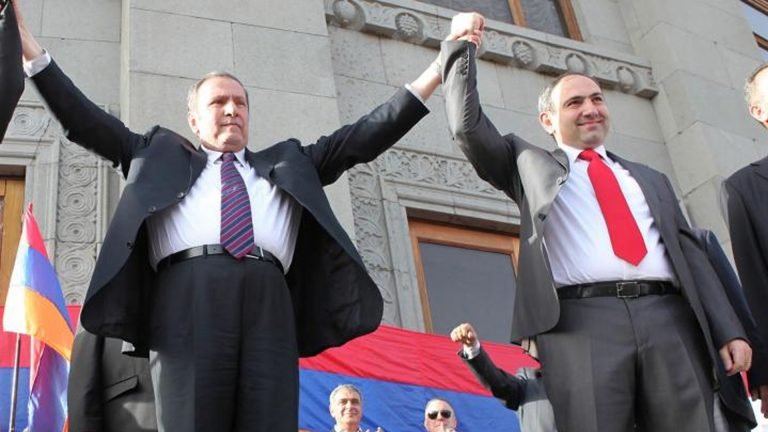
At the time, rumors circulated about Pashinyan’s status as a sidekick of Armenia’s first president Levon Ter-Petrosyan, who had bestowed a reciprocal “Artsakh lands for peace” political philosophy onto his protégé. Yet the questioning of the sanctity of Artsakh was a position so untenable in Armenia that it had quickly led to Ter-Petrosyan’s resignation back in 1998. Yet even as late as 2008, Pashinyan can be seen at a rally for Ter-Petrosyan’s political reemergence shouting, “We need to rid our city of this Karabakh scum!” While no doubt a reference to the Artsakh-born Armenian presidents Robert Kocharyan and Sargsyan, it was one of countless instances of Pashinyan needlessly sowing division between the already fragmented nation.
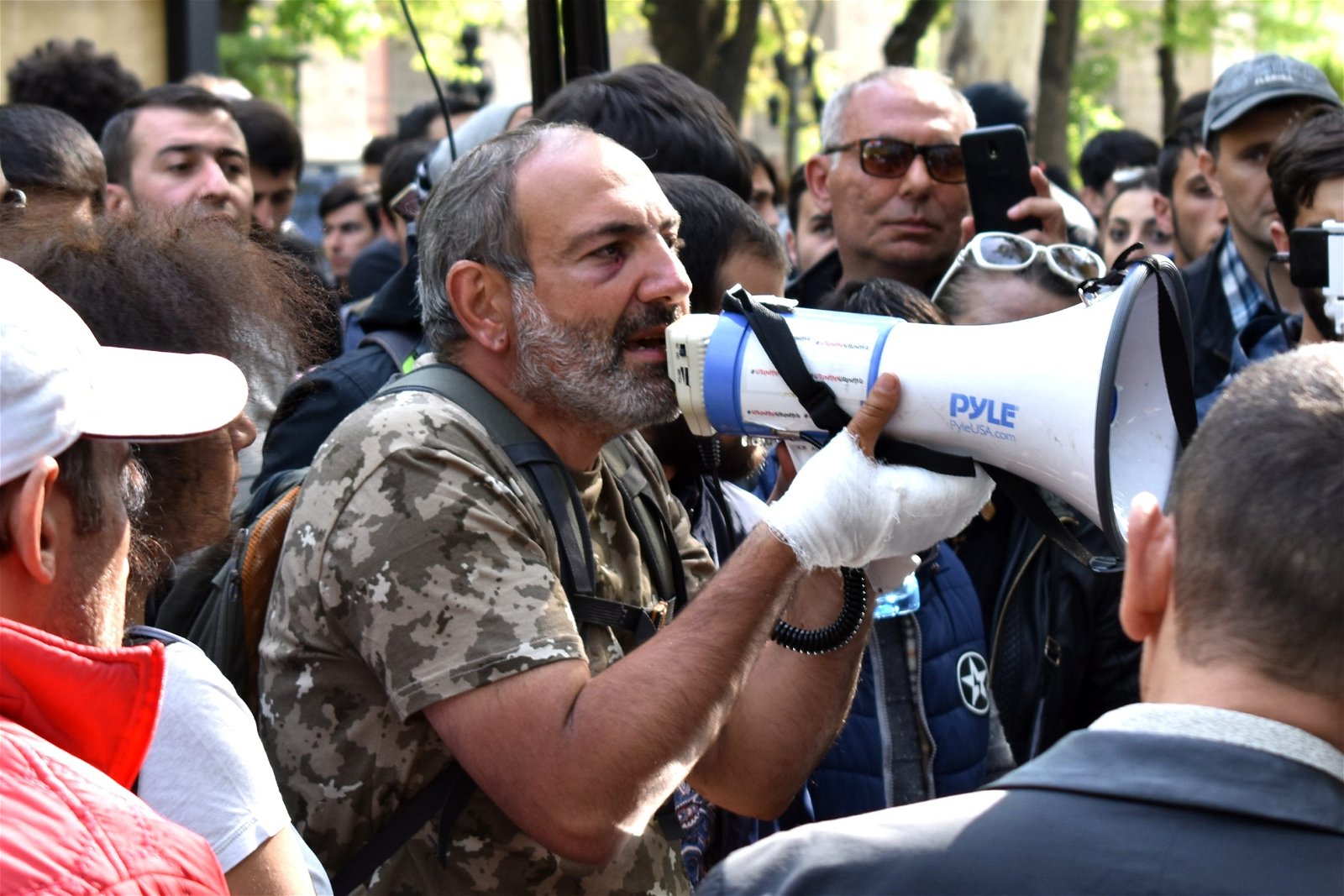
Still, in 2018 all of this seemed to be in Pashinyan’s distant past and, if not forgettable than perhaps excusable in the context of Sargsyan’s constitutional amendments which had seemingly no purpose other than to consolidate his power in the Armenian government. Pashinyan, with the support of nearly all western NGOs including George Soros’ Open Society, undertook a campaign to topple Sargsyan’s government, and there began Pashinyan’s famous “peace march” across Armenia to protest Sargsyan’s re-election. Somehow, by the time Pashinyan’s march had ended, he had materialized as a fully bearded replica of the iconic Karabakh war hero Monte Melkonian, cloaked in military camouflage with a giant bandage wrapped around his hand.
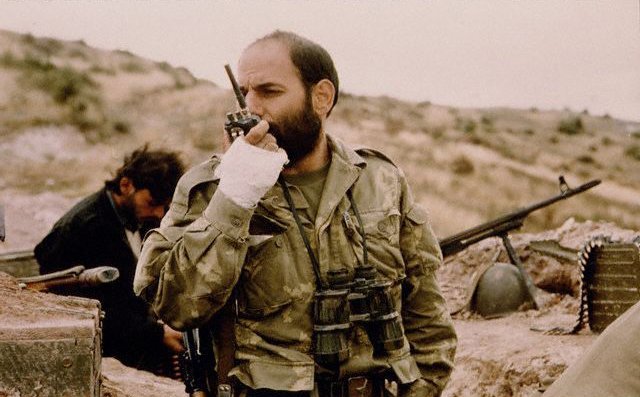
Astute political branding notwithstanding, when the chips fell, Pashinyan had replaced Sargsyan with a groundswell of public support for the Velvet Revolution, and Armenia’s future never seemed clearer with the bite-size platform of eradicating corruption.
In such emotionally trying and difficult times, there is no shortage of inspiration for second-guessing the actions of world leaders and magnifying potholes along Armenia’s journey as stand-ins for the cause of the derailment towards its current predicament.
For example, lessons from history would indicate that the liberation of Karabakh by Armenian forces in the 1990s from the war’s low point only took place after post-Soviet Armenia’s exploratory flirtations with western governments subsided, after which Russian support boosted Armenia’s military capabilities. So when Pashinyan came to power with supporters chanting heavy-handed and profane slogans against Russia, it served only to endanger the security of Artsakh’s Armenians.
Even that could have been mitigated perhaps if such disdain had been relegated to the behavior of a few unruly supporters or a handful of My Step (Իմ Քայլը) party MPs in the National Assembly, but instead it needlessly infected even the Pashinyan administration’s actions with respect to Russia.
With Artsakh now under serious threat and the future security of Armenia threatened by a growing Turco-Azeri alliance, one wonders what need there was for Pashinyan to refuse a personal invitation from Putin for the World War II commemoration last May or to reject a meeting with him when he visited Armenia.
In the wake of the recently signed insidious agreement, Pashinyan’s actions have been questionable to say the least, especially for a political force that ostensibly came to power under the auspices of western democratic ideals of freedom and openness.
The suppression of freedoms such as press and speech have been seen numerous times throughout Pashinyan’s two and a half years in office. Most notably this past week, there were the arrests of ARF Supreme Council of Armenia member Artsvik Minasyan, Arsen Babayan of the Homeland Party and Ara Hakobyan of the National Agenda party, ARF Supreme Council of Armenia chairman Ishkhan Saghatelyan, ARF Supreme Council of Armenia member and editor of Yerkir Media Gegham Manukyan, Homeland Party chairman Artur Vanetsyan, Prosperous Armenia Party chairman Gagik Tsarukyan and leader of the Republican Party of Armenia Edward Sharmazanov. Clearly arrests were targeted against all opposition parties in an effort to suppress their right to critique the decisions undertaken by Pashinyan.
Pashinyan’s signing of the deal was a complete blindside to all of Armenian politics including his own party. Many of his My Step party members have resigned due to his unilateral lack of transparency and their incredulousness at hearing of the most recent Karabakh deal from the media, including Vardan Atabekyan, Gayane Abrahamyan, Taguhi Tovmasyan, Lusine Badalyan and Arsen Julfalakyan, as well as the head of Deputy Prime Minister’s office Varak Sisserian. The resignations are an obvious political distancing from the chaos caused by the prime minister.
Other prominent politicians have also been angered by Pashinyan’s lack of transparency, most notably Armenian President Armen Sarkissian, who said he first heard of the agreement through the media. Sarkissian just called for Pashinyan’s resignation and a snap election in Armenia.
Even still, critiques of administrations always suffer from one fatal flaw, and that is information. Despite Pashinyan’s obvious missteps in the recent conflict, recently undemocratic and heavy-handed actions domestically, or blundering rejections of Armenia’s status as, for better or worse, being downstream of Russia’s global power politics, there is no way of knowing exactly what the ground situation was in Artsakh when Pashinyan signed over what seemed like a disastrous deal. It is entirely possible that the whole territory was mere days away from being wholly captured by Aliyev’s army, though that fact itself raises questions as to why the deployment of Armenian military reinforcements never seemed present in Karabakh proper.
Above all the second guessing and hindsight, however, there emerges one glaringly obvious conclusion and it’s that the Pashinyan administration must step down to make way for new elections in the wake of the fallout of the Karabakh war.
The current agreement is too threadbare to give an indication of the manifold ways the current situation could play out. Not only is the timeline uncertain but the status of certain territories including Artsakh itself do not even seem to be known to any of the parties involved. With Russian “peacekeepers” on the ground for the foreseeable future, Putin has untold power to tilt all of the uncertainty in Armenia’s favor, or against it. With the disastrous new status of Artsakh and Putin’s recent declaration that “the final status of Karabakh is not settled,” it is clear the Russian president is angling for a change of administration that could reflect favorably in the outcome. With so much looming uncertainty and heavy Russian presence now even more deeply embedded in the most volatile conflict zones of the Caucasus, it’s clear that Pashinyan, whose still wet signature is on the trilateral agreement, has the least likely chance to be able to wrestle with the deal’s repercussions. Any other administration would at the very least have additional wiggle room and plausible deniability that they were not the ones who signed on the dotted line.
Pashinyan captured the public consciousness and was inaugurated into the hearts and minds of the people; they are the ones who gave this struggling journalist with no political or military experience a chance. Now more than ever and while facing the aftereffects of this latest bloody confrontation with Azerbaijan, the Armenian public has a right to decide whether or not to persist through these difficulties with or without Nikol Pashinyan and his My Step party, and to make this decision with the newfound knowledge that Pashinyan’s policies and behavior may have had vast regional implications that have resulted yet again in the painful ceding of Armenian territory into enemy hands.


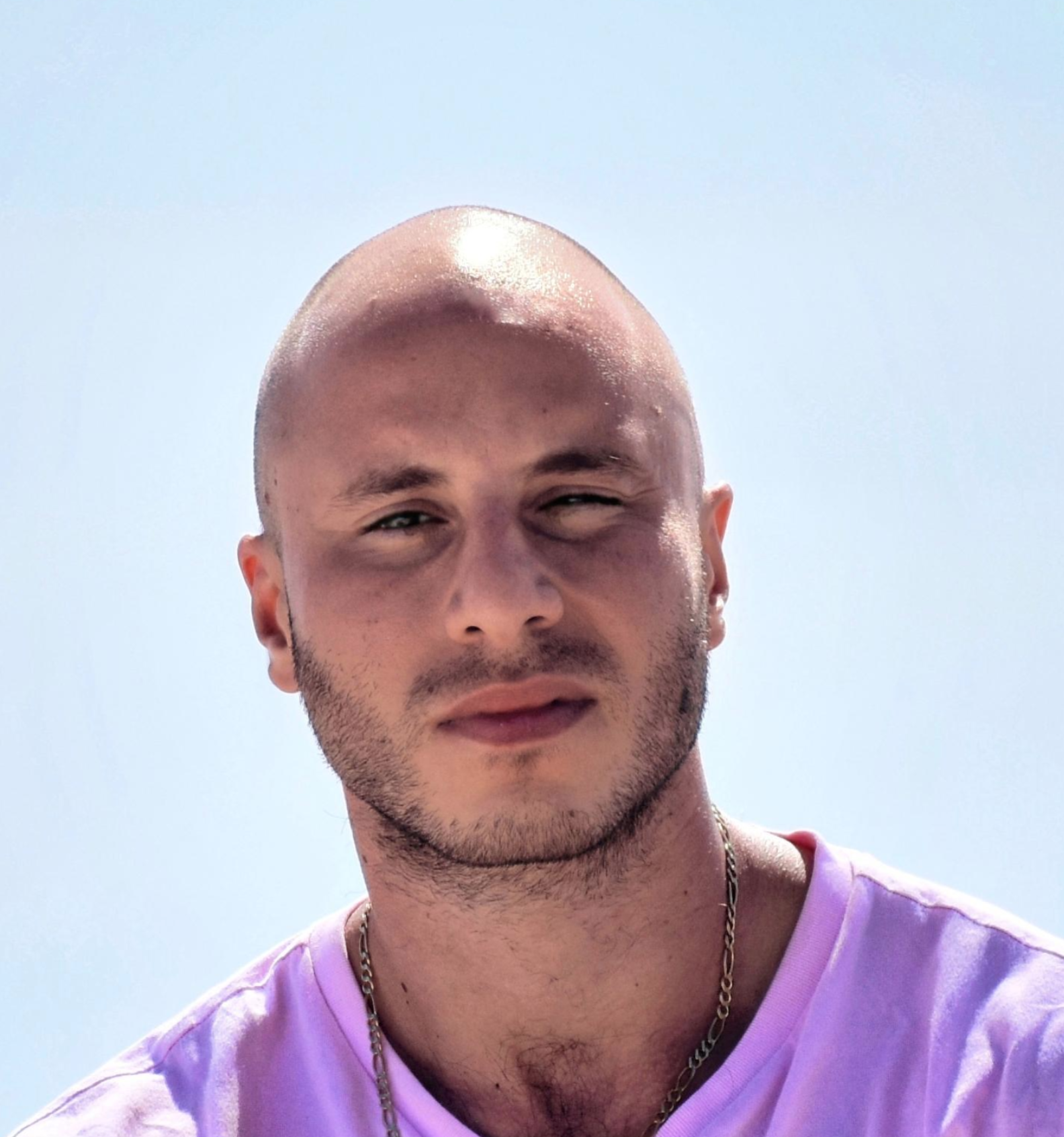
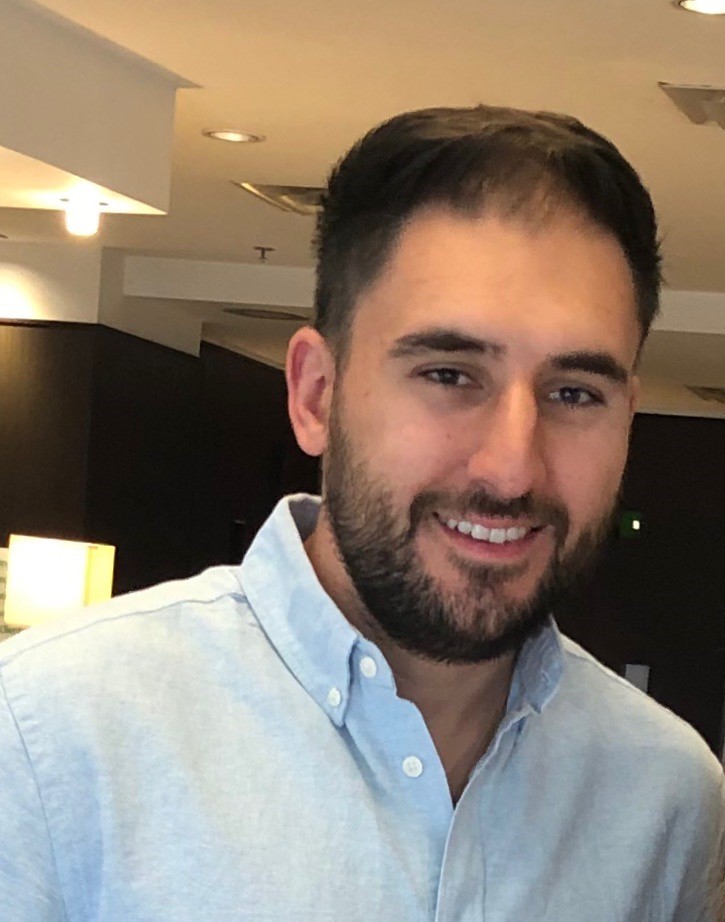
I commend the authors as they articulated many numerous questions that are not to blame the current leadership , but to enlighten the public in the various known facts, and unknown present conditions. The term Unity has been used indiscriminately, and if by chance you believe for the good of the nation that Pashinyan must step aside, then those who push for unity are not following their own message of allowing the opposition a voice. Unity can be about moving forward with new leadership.
Bottom line- in a parliamentary system of government , the leader of a lost war, and lost lands, simply has to resign under a vote of no confidence, no matter how ” God ” like his past accomplishments may or may not be.
As President Truman said. ” The bucks stops here. Mr. PM, It’s time to go, for the security and future of our beloved Armenia/ Artsakh. I’ll pack your bags!
Nikol Pashniyan must step down, he failed to start wartime production of X-55, sending patriots into meat grinder without air cover. At a pricetag of 1.5 M compared to 5M of Bakhtyar, we could have had 3 for every Azheri drone.
Armenia and Armenians need to step up thier Game in every aspect of life and Country Keeping including modernizing thier military and economic structure. ASAP.
Very impressive and first class article. It really addresses numerous points, dynamic, strategic, and it especially elicits the character and motives of PM Pashinyan. If there was one thing I may have liked to see is to accentuate the urgency of the resignation of the PM by doing the right thing and the noble thing for Armenia and Armenians before the world at this sensitive juncture. Perhaps this is omitted for a reason to soften his stony heart on the unjust arrests of the ARF members and to expedite their release!
This is a biased article and is designed to further divide the Armenian people. For example, the authors criticize the government for the arrests of Vanetsyan and his gang, conveniently failing to mention the attempted assassination of the Prime Minister. Why I ask? Should the authorities allow the illegal and violent overthrow of the government? Vanetsyan, most recently, threatened Mr. Pashinyan and his family with physical harm, while on bail for the initial crime! Yet, the article is silent about it. All this that were arrested, were arrested for breaking the law and will be prosecuted according to the law.
As for resigning, the only people that want that are his political opponents doing the bidding of billionaire oligarchs for obvious reasons.
PM Pashinyan IS the only person that can and will rid Armenia of corruption!
The army loves him and so are the people of Armenia and Artsakh.
Those that want to cancel the recent ceasefire agreement offer nothing. It is rather easy from behind the computer screen, thousands of miles away from the bombs and rockets to criticize the actions of a leader who did what needed to be done to save Artsakh and the lives of 20,000+ soldiers.
I’m very disappointed to read these types of articles which offer nothing constructive.
It seems that the war was completely mismanaged. The full potential of the Armenian military was not used for what ever reason. Yes other factors like the theft of wealth by the past Karabakh presidents which caused massive emigration and years of loss of financial military resources for purely self gain, plus the possible miscalculation of the Russian “ally” assistance scenario and overestimation of Armenia’s ability of being the security guarantor of Artsakhs against not only Azerbaijan but Armenians enemies like Turkey, Israel and foreign mercenaries, all played a role, but Pashinyans clear lack of political or military savvy is perfectly clear. Not sure what Pashinyan can do or say anymore that can gloss over the major loss that will be felt by all Armenians for generations to come that this man at the helm now represents. He seems to have a ‘look on the bright side’ approach. The only positive approach is definitely Universal Armenian unity. 17 current factions is ridiculous. However its tough to be united with a leader who represents such major loss for all Armenians.
Oh the poor ARF members. Such pillars of Armenia and Artsakh over the years. And how many seats in the parliament did the people vote for them to claim?
A precise, well reasoned article gentlemen.
In response to Armen Tashjian’s comment above about your “conveniently failing to mention the attempted assassination of the Prime Minister” just so there is no misunderstanding, the so-called assassination attempt referenced by Tashjian was summarily thrown out of court after Nikol’s arresting agency had to admit to tampering with and altering audio evidence to make it sound like such a plot was in the making. The only prosecution that should now take place is for the bogus and fraudulent charges concocted by Nikol and his dimwitted henchmen.
Whether by virtue of incompetence or treachery, Pashinyan is an abject failure and for the good of what remains of the Armenian Nation must go…and quickly.